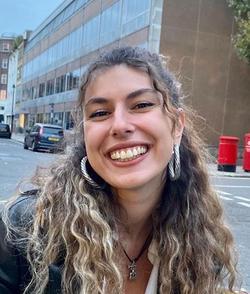Meet Early Career Microbiologist of the Year poster finalist: Danai Irakleidi

What do you love most about your job?
I find the world of research truly fascinating, as it allows you to constantly explore new avenues, in most cases entirely novel to the field, while giving you the freedom to add your own touch to everything you do, from choosing the type of experimentation you will undertake to the way you will present your findings. As contradictory as it may sound, the world of microbiology is enormous and the possibilities within it never cease to exist. I consequently, love the endless options that this line of work provides and how challenging but simultaneously rewarding it may be.
What are your current research interests?
I find bacteria extremely interesting. They are miniature organisms that have developed certain extremely elaborate systems that have allowed them to survive for billions of years. In detail, I am particularly curious about the numerous RNA repair mechanisms that certain bacterial species – mostly harmful to humans – have evolutionarily developed and how these systems have made them resistant to commonly used antibiotics. My main focus is understanding how these systems operate on the biochemical level, by identifying key protein-protein and protein-ligand interactions that enable them to get activated and respond to the stress stimuli imposed on the cell.
How would you explain your research to a GCSE student?
Escherichia coli and Salmonella enterica are two bacterial species that in many cases can pose a threat to human health. Humans try to combat such bacteria with the use of antibiotics however, many strains have developed resistance against them, thanks to the presence of an RNA repair mechanism that they naturally possess. Once active, this system can repair vital RNA molecules previously damaged by the antibiotic used, and therefore, restore their structure and function altogether. My work focuses on understanding which molecules signal the system’s activation and how these molecules interact with the proteins comprising the system.
How has getting involved with Microbiology Society activities benefited your professional development?
The Microbiology Society provides a space for researchers and people with common interests to form a community, interact, exchange ideas, and form collaborations and partnerships. Consequently, the activities proposed and promoted by the Society encourage especially early career microbiologists, like myself, to make use of the above opportunities and form meaningful connections, as well as gain new ideas on how to conduct research. Both of which have proven to be immensely useful for my professional development.
What advice would you share with someone interested in working in this field?
The research field of microbiology and biochemistry is, definitely, a highly rewarding one. The production of novel results after thorough experimentation can generate a sense of accomplishment and pride that is very fulfilling. However, one piece of advice I would give is to allow the above feeling to flourish, you need to be patient and accept that failure forms an indispensable component of success, as only then you can become your truly best self in the field.
You can find Danai on LinkedIn.
